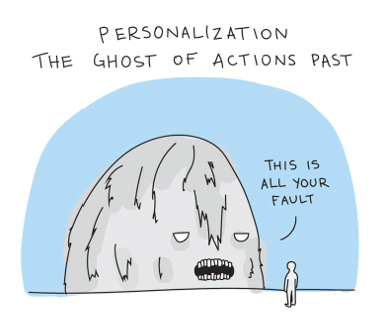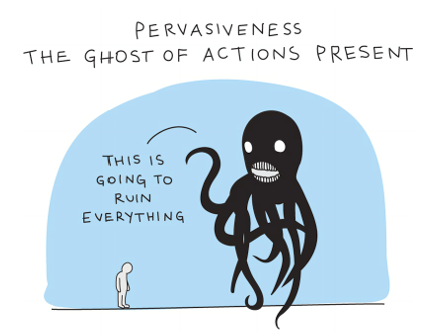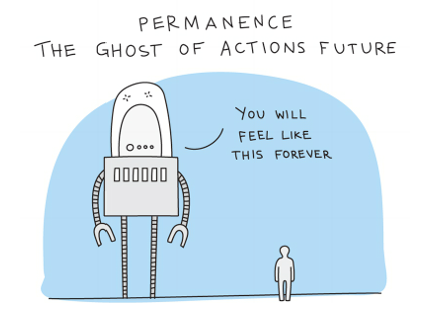So many things influence, impact, improve, or impair our wellbeing. In our work, and our personal life. Who we spend our time around. The entertainment we are exposed to. Even the time of year – analysis by the music-streaming platform Spotify revealed that February is when most people are at their gloomiest!
But is it possible to influence your thinking for the better, and subsequently your attitude and wellbeing?
“The greatest weapon against stress is the ability to choose one thought over another.”
William James, Philosopher & Psychologist
The power of a positive attitude
- Research released by Harvard’s Department of Social and Behavioural Sciences revealed that having a positive outlook is linked with a longer life expectancy.[mfn]Henry, V. (2018) ‘The New Rules For The Power Of Positive Thinking’. Forbes. – https://www.forbes.com/sites/henrydevries/2018/09/28/the-new-rules-for-the-power-of-positive-thinking/#2ff7214e5369[/mfn]
- When we perceive typically negative experiences, such as stress, as being positive, we are more likely to be responsive in stressful or challenging situations.[mfn]Crum, A., et al. (2016) ‘The role of stress mindset in shaping cognitive, emotional, and physiological responses to challenging and threatening stress’. Forbes. Anxiety, Stress & Coping [/mfn]
- Regularly experiencing positive emotions can act as protective buffer against potentially stressful experiences, and make it easier to bounce back from negative events.[mfn]Tugade, M. M., Fredrickson, B. L., & Barrett, L. F. (2004). ‘Psychological resilience and positive emotional granularity: examining the benefits of positive emotions on coping and health.’ Journal of personality, 72(6), p. 1161–1190.[/mfn]
“...findings suggest that we should make efforts to boost optimism, which has been shown to be associated with healthier behaviours and healthier ways of coping with life challenges,”
Eric Kim, Research Fellow - Harvard Department of Social and Behavioural Sciences
On the other hand…
Repeatedly taking part in negative thought patterns increases the susceptibility to draw pessimistic conclusions from information, and respond poorly during stressful or challenging situations[mfn]Krahé, C. et al. (2019) ‘Are Different Forms of Repetitive Negative Thinking Associated With Interpretation Bias in Generalized Anxiety Disorder and Depression?’, Clinical Psychological Science, 7(5), pp. 969–981.[/mfn][mfn]Crum, A., et al. (2016) ‘The role of stress mindset in shaping cognitive, emotional, and physiological responses to challenging and threatening stress’. Forbes. Anxiety, Stress & Coping [/mfn].
The theory of ‘broaden & build’
Was developed in the 90’s by psychology professor Barbara Frederickson, and indicates that regularly participating in certain activities, such as mindfulness, can evoke more positive emotions.Get creative
See yourself in your best light
Putting time aside to visualise the best version of yourself has also been shown to improve and maintain ones mood and attitude.[mfn]Sheldon, K. (2007) ‘How to increase and sustain positive emotion: The effects of expressing gratitude and visualizing best possible selves.’ The Journal of Positive Psychology, 1(2), p. 73-82[/mfn]And… breath
Spending time meditating or practicing mindfulness has been shown to incrementally increase both position emotions and thinking patterns. [mfn]Frederickson, B., et al. (2008) ‘Open hearts build lives: Positive emotions, induced through loving-kindness meditation, build consequential personal resources.’ Journal of Personality and Social Psychology, 95(5), p. 1045–1062.[/mfn]Beware obsessive pessimism…
- Personalisation – thinking that a negative event is all your fault
- Pervasiveness – that it is going to ruin every aspect of your life
- Permanence – that you are going to feel like this forever




How do you break cycle loop of negative thinking?
Well, the one of the most effective methods is to first recognise if you are falling foul of one of these dastardly P’s, as often awareness is enough to help give you the perspective that you need.
The second method is to combat each of the three P’s with their own respective adversary. Which means:
- If you find yourself personalising events, remember – don’t make it all about it you! Take a moment to recognise the things that were outside of your control.
- When you find your thoughts taking a pervasive turn, try to recognise some of the things that are not going to be affected by the current turn of events
- And finally, if permanence strikes, take a step back, breath, and identify some of the things in the future that you know you are looking forward to
Not all negative thoughts are bad
As with most advice, it is crucial to aspire for balance. Not every thought or experience can be framed in a positive light, and challenge has been recognised as a critical part of growth.
Therefore do not attempt to block out all negative thoughts, and recognise the perspective that they can bring you, instead give that perspective boundaries. Time box it so your reflection doesn’t turn it rumination.
As ever, if any of this has been of interest, and you would like further information on how this can be used to further your own development, or that of your colleagues, don’t hesitate to get in touch.

